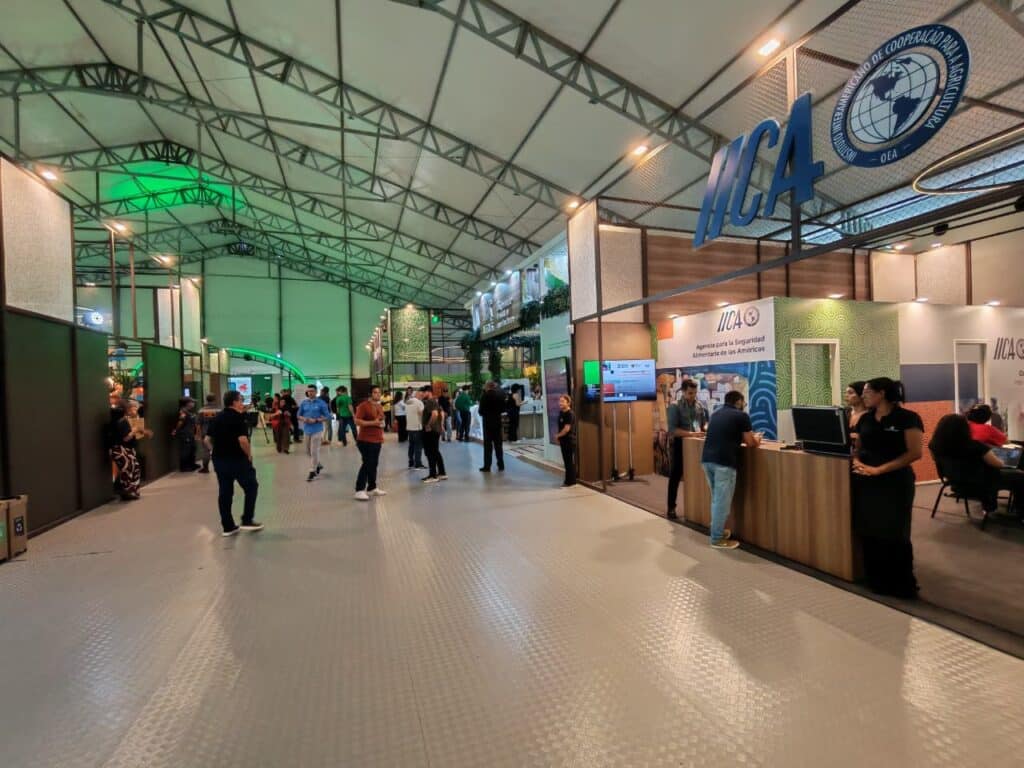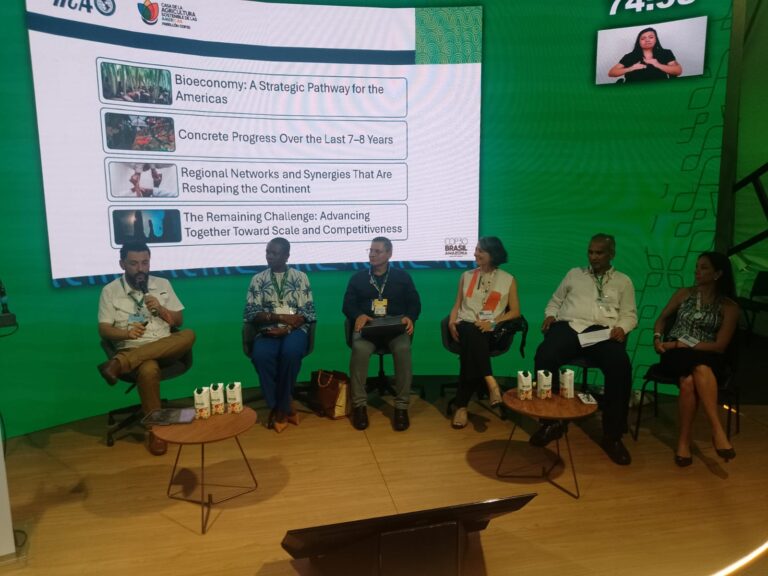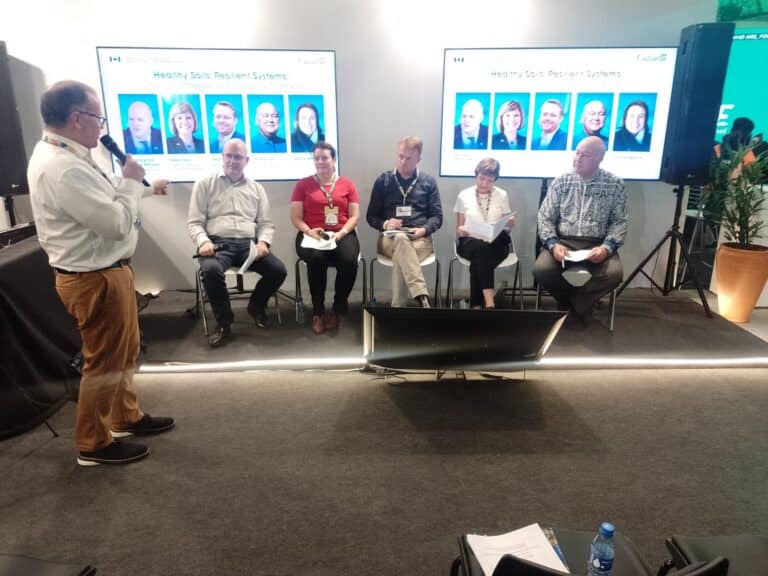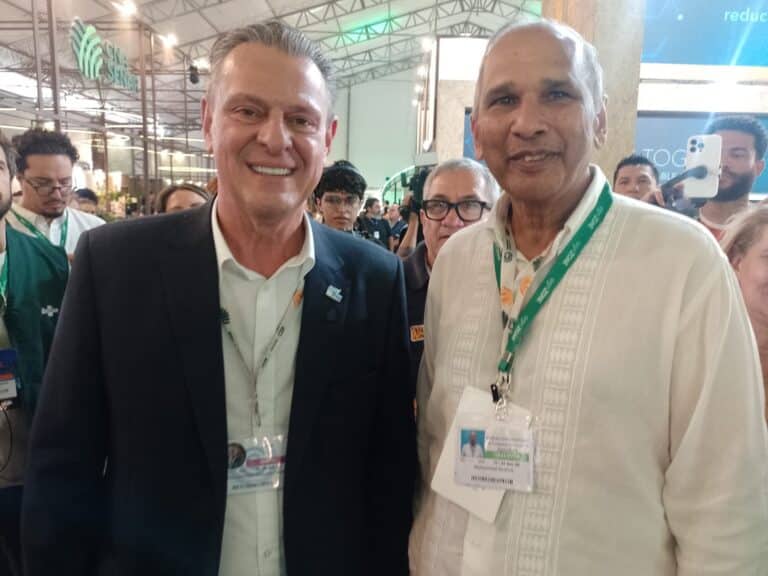
Belém do Pará, Brazil, 26 November 2025 (IICA) – The ongoing transformation of agriculture in the Americas to consolidate its role as a guarantor of global food security and sustainability was showcased to the world by the Inter-American Institute for Cooperation on Agriculture (IICA) and its partners during COP30.
The conference held in Belém, capital of the Brazilian Amazonian state of Pará—which attracted more than 50,000 people from nearly 200 countries—marked the return of the world’s largest environmental debate forum to the American continent after eleven years.
The pavilion of IICA and its strategic partners at COP30 was called the Home of Sustainable Agriculture of the Americas, and served as a setting where, for two weeks, concrete cases and scientific evidence were presented illustrating the progress achieved across the continent in building more productive and resilient agriculture. It was also a space to discuss ways to deepen that transformation in a context of growing challenges.
Thus, IICA consolidated its role as a catalyst for the collective action of countries and strengthened the position of the region’s agriculture in the discussion on the future of production methods and the pathways to protect the planet and its natural resources.
At the IICA pavilion, the key actors in the debate were representatives of the private sector, agriculture officials from governments across the continent, members of rural communities, academics, and specialists from international organizations.
Some of the topics discussed included regenerative agriculture, biofuels in the energy transition, family farming, carbon markets, digital agriculture, animal health, financing mechanisms for green projects, soil health, sustainable livestock production and the need for a new narrative that sheds light on the role of agriculture in the Americas as a solution to global challenges.
This was the fourth consecutive time that IICA served as the voice of the region’s agriculture at a COP, following its participation in Egypt in 2022, the United Arab Emirates in 2023 and Azerbaijan in 2024.
The Institute’s partners in this initiative were Canada Agriculture and Agri-Food, Bayer, CropLife International, Elanco, the Organization of American States (OAS), PepsiCo, Protein Pact, the U.S. Dairy Export Council (USDEC), the U.S. Soybean Export Council (USSEC), the World Bank, the UKFCDO and World Vision International.
A showcase for science and innovation in agriculture
The pavilion of IICA and its partners was installed in the AgriZone, a showcase of new technologies applied to agriculture that demonstrated how productivity and natural resource protection can advance hand in hand thanks to science and innovation.
By decision of the Brazilian government and the Brazilian Agricultural Research Corporation (EMBRAPA), this was the first time that a COP featured a space dedicated specifically to agriculture.
EMBRAPA is a public institution and an ally of IICA that has been instrumental in Brazil’s agricultural transformation—from being a food importer just a few decades ago to becoming a global agri-food powerhouse today.
IICA Director General Manuel Otero highlighted the AgriZone as a success and called for institutionalizing it at future COPs to present and discuss the role of the agriculture sector as a solution to economic, climate and social challenges.
“In Belém do Pará, the world witnessed the transformations taking place around sustainable tropical agriculture, which is already a reality and is destined to become, increasingly, one of the most important sources of food production in harmony with the environment”, Otero said.
The IICA Director General especially valued the role of private companies that joined the Institute in the effort to set up the Home of Sustainable Agriculture of the Americas at COP30. “Ultimately”, he said, “they believe in the role of international cooperation and in the role of the private sector in transforming agrifood systems”.
Brazil’s Ministers of Agriculture and Livestock, Carlos Fávaro; of Agrarian Development and Family Farming, Paulo Teixeira; and of Social Development, Family and Fight Against Hunger, Wellington Dias, were among the leaders who visited the IICA space in the AgriZone.
In addition, the IICA Director General shared events with EMBRAPA President Silvia Massruhá; former Brazilian Agriculture Minister Roberto Rodrigues; the Executive Secretary of the Legal Amazon Consortium, Marcello Brito; and former Brazilian Minister of the Environment and IICA Goodwill Ambassador Izabella Teixeira, among others.
IICA’s Director General-elect, Muhammad Ibrahim, also took part in COP30. He held high-level meetings, listened to and presented proposals for his future administration, and committed to strengthening the hemispheric organization’s work to enhance the role of the agriculture sector as a driver of economic development and improved quality of life in rural areas.
Ibrahim—who will assume leadership of IICA on January 15—met in Belém do Pará with Bolivia’s new Vice President, Edmand Lara, and the Minister of Rural Productive Development and Land, Óscar Justiniano, who expressed their interest in deepening the relationship with IICA.
Cooperation to integrate science
In addition to its own pavilion in the AgriZone, IICA participated in official COP30 panels and organized side events with influential multilateral organizations that are its strategic partners, such as the Inter-American Development Bank (IDB), the International Fund for Agricultural Development (IFAD), and CAF–Development Bank of Latin America and the Caribbean.
During COP30, the hemispheric organization also signed an agreement with EMBRAPA formalizing cooperation to implement the AgTech Radar initiative throughout the region, which promotes innovation in the agricultural ecosystem.
Otero met with Henry González, Director of Investments at the Green Climate Fund (GCF), which will provide financing for the project “Mitigation and adaptation to climate change through agroforestry systems in cocoa production in the Amazon and Atlantic Forest biomes”.
The initiative will be implemented by the Government of Brazil, through the Ministry of Agriculture and Livestock (MAPA) and its Executive Commission for the Cocoa Crop Plan (CEPLAC), in partnership with IICA.
Furthermore, in Belém do Pará, the Amazon Cooperation Treaty Organization (ACTO), the KfW Development Bank—on behalf of the German Federal Ministry for Economic Cooperation and Development (BMZ)—and IICA signed an agreement to drive an investment of 18.7 million euros to strengthen the capacities of eight South American countries to prevent and recover from forest fires.
IICA’s presence at COP30 also continued the hemispheric agenda consolidated during the Conference of Ministers of Agriculture of the Americas 2025, held earlier in the month in Brasília.
More information:
Institutional Communication Division.
comunicacion.institucional@iica.int











